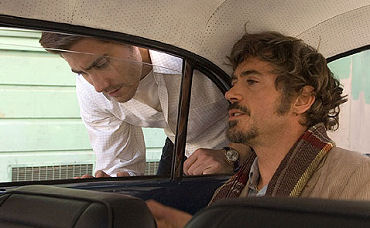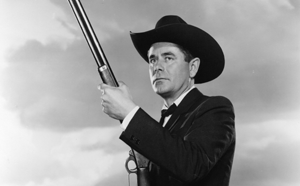On the occasion of its Venice Film Festival showing, Variety‘s David Rooney has gone thumbs-down on Douglas McGrath‘s Infamous, the other Truman Capote-writes-“In Cold Blood” movie from Warner Independent (opening 10.13). “There was an integrity and character- complexity to Bennett Miller ‘s Capote that’s missing from this glossier biopic…none of it rings true…Infamous doesn’t measure up to its predecessor and seems unlikely to echo the attention it received.” But Hollywod Reporter critic Kirk Honeycutt thinks it’s pretty damn good. Infamous, he writes early on, “gives you the unique opportunity to see how two sets of filmmakers can take exactly the same story, make extremely tough though different choices in emphasis and tone and achieve brilliant movies.” Go figure. I’ve seen it, but no review until the Toronto Film Festival.
Month: August 2006
Boring Saint
Boring Saint
Variety‘s Phil Gallo starts out telling it straight and true about David Leaf and John Scheinfeld‘s The U.S. vs. John Lennon (Lionsgate, 9.15) in his Venice Film Festival review, but then he begins to equivocate and cottonball. As does the film itself.

Here are my three main arguments with the documentary, which Lionsgate will release on 9.15 after showings at the Telluride and Toronto film festivals, along with Gallo’s review:
(a) The doc does “persuasively chronicle an artist sticking to his guns through activism” as the U.S. government conspired to kick Lennon out of this country in the early ’70s as a way of getting back at him for using his celebrity to stir up sentiments against the U.S. military’s fighting of the Vietnam War. And Gallo is dead right in saying that “by getting Ono to cooperate and open the vaults, the storyline follows the Ono-approved bio that posits Lennon as saint, excising his dark periods and their years apart, which could have enhanced the portrait.”
< ?php include ('/home/hollyw9/public_html/wired'); ?>
The Lennon portrayed in this film is indeed scrubbed clean and phony as a three-dollar bill, and there’s no doubt in my mind that Leaf decided on this portrait — Lennon as a kind-of St. Francis of the anti-war movement, a guy who did nothing but good things and spoke only of love and peace and stopping the killing — under the influence of his and Scheinfeld’s alliance with Lennon’s widow.
I call it the “Curse of Ono” — the more control she seems to have over any portrait of the late ex-Beatle, the more sugar-coated it turns out.
Like anyone else, Lennon was a mixed bag — part genius, part beautiful guy, part angry guy, part saint, part asshole, part man-of-courage, part prima donna, part gifted troubadour, part abusive drunk (during his 1974 “lost weekend” phase), part mystical seeker. But you only get the positive stuff from Leaf-Scheinfeld-Ono. And after an hour or so of the vigilant, heroic, positive-minded Lennon, you want to barf.

It’s almost like listening to a speech by Big Brother: “John Lennnon was God’s gift…better than most of us…learn from his story…praise the good things he did for this country…follow in his footsteps!”
There’s nothing more boring and infuriating, even, than a doc determined to sweeten and sanitize the truth. Anyone who knows anything about the real John Lennon, warts and all, will be shifting in their seat and going slowly mad.
(b) 40 Lennon songs — 37 from his solo career — “are used pointedly [and] out of chronological order and tied to the visuals thematically,” Gallo notes with some approval. He’s wrong to wink at this. The out-of-chronology thing is bad, but what really hurts are the painfully on-the-nose cues that intro the playing of each tune. Thematic links between what we’re seeing or hearing about Lennon on-screen and the songs that pop up a few seconds later are almost enough to turn a longtime Lennon fan off his music for life.
The idea in stuffing so many songs onto the soundtrack, of course, is to market a new double-album, which, of course, Ono and VH1 (which partly financed the pic) will profit from. I appreciate that there are many tens of thousands of GenXers, twenty-somethings and teenagers who barely know Lennon’s stuff and will be turned on to his music by this film, and that’s fine…but if you already know the songs and the drill, it’s truly awful to hear them re-played alongside a series of dreadfully clunky biographical observations.

(c) The film completely ignores the biggest irony that naturally goes with any look at Lennon’s life as an engaged, socially involved artist and agitator, and so does Gallo. I’m speaking of the apparent reason Lennon was killed by Mark David Chapman on 12.8.80, which had to do with Chapman, a psychotic nerd and homicidal asshole, deciding that Lennon had to pay the price for withdrawing from being the courageous and nervy “John Lennon” of legend and turning into a house-husband, abandoning his musical career, ceasing his political activism, etc.
In short, Leaf and Scheinfeld’s movie celebrates what a brave and commendable guy Lennon was when he got into a standoff with the government, but doesn’t even acknowledge that his abrupt withdrawal from this activity, from occupying his persona as Lennon-the-bold-and-outspoken, is what ended his life. They could have spoken to some friend or biographer who could have at least mentioned this (without giving Chapman’s motive any respect, I mean)…but the irony never surfaces. It isn’t even breathed upon.
Open “Zodiac” :eter
From: Jeffrey Wells, Hollywood Elsewhere. To: Dreamamount publicity/ marketing. Re: An open letter about the selling of David Fincher‘s Zodiac (currently set for release on 1.19.07).

Greetings and salutations, guys: I’m writing to ask what the upside is in not platform-releasing Zodiac at the end of December, which is what certain Dreamamount parties are apparently against at this stage. A late December release, obviously, will put Zodiac into the derby and make it eligible for whatever possible critic awards and or Academy nominations that may result. This, obviously, would fortify the 1.19 general release to some extent.
Not putting Zodiac out as an ’06 platform end-of-December release strikes me as nonsensical, certainly from the standpoint of Zodiac‘s admirers or from the stand- point of any kind of opportunistic, fair-shake approach to creative marketing. Very clearly, going out cold on 1.19 without the buildup of a December platform opening isn’t going to help.
Zodiac is, I’m hearing, a serious quality-level piece. It’s also a longish cerebral procedural, a ’70s period drama, a non-conventional cop thriller. It needs some media massaging to help prime the pump.
The word around town is that there are two reasons that certain parties with Dreamamount may be against the platform-release idea:
(a) Dreamamount will have four films in Oscar contention by the end of the year (Flags of Our Fathers, Dreamgirls, Babel, World Trade Center) and some p.r. and marketing people think that a fifth film in the hopeful-Oscar-pipeline will strain the resources of Dreamamount marketing/publicity and cause this or that film to receive less of an Oscar push effort in terms of manpower and/or ad dollars, and…
(b) DreamWorks honcho David Geffen wants an all-out, balls-to-the-wall Oscar push for Dreamgirls, which is his personal baby, and he doesn’t want to hear about a fifth film potentially sapping the energy or marketing budgets allocated for Dreamgirls push.
What does Paramount/DreamWorks think about all this? What do readers think? Is there merit to the David Geffen theory? This issue has been festering for a long while and I’d like to get some reactions from all corners.
Jackson’s WWII flick
Peter Jackson, the reigning enfant terrible and anti-Christ of overbaked, overcranked CG movies, is threatening to produce a remake of a well-regarded British World War II flick called The Dam Busters (1954). Jackson’s King Kong animator Christian Rivers will direct…an animator! Obviously there’s a determination to play heavily with the visual element, or Rivers wouldn’t have the gig.
The original film told the true story of how Britain developed “bouncing bombs” that destroyed German dams during that conflict. “There’s that wonderful mentality of the British during the war,” Jackson told Screen Daily. “That heads-down, persevering, keep-on-plugging-away mentality which is the spirit of Dam Busters.”
Trust me — the spirit of the Jackson-Rivers film will be a war against history. What you will see on the film will be CG’ed within an inch of its life and will in some ways resemble the true reality of wartime England in the 1940s, but it will create an alternate reality as well. It’ll be primarily about Peter Jackson’s pumped-up ego and imagination (i.e., his determination to re-imagine whatever he feels like re-imagining and to piss on accurate historical detail whenever the whim strikes), and dollars to donuts it’ll run well over two hours.
The ’54 film, based on Paul Brickhill‘s book, costarred Michael Redgrave and Richard Todd.
Weekend tracking
Neil LaBute‘s The Wicker Man, which Warner Bros. won’t show to the press, is apparently going to be the biggest peformer this weekend. 72% general awareness with a 34 definite interest and a first choice of 11. We’re looking at a four-day weekend (Labor Day holiday is on Monday, 9.4) so figure somewhere between $15 and $20 million.
Crank will probablycome in second among the newbies — 45 general awareness, 32 definite intrest, first choice 8.
The Illusionst, which I finally saw two or three nights ago and is better than I figured it would be, is going wide. And there’s also Crossover, the decent-looking black basketball movie from Screen Gems.
Samuel Goldwyn’sLassie, a first-rate family-geared film that I saw on DVD last night, could do some real business if it had a more aggressive distributor. The problem is that Goldwyn doesn’t have any money. Their rep is “good taste, no pockets.” If you go with Goldwyn, it’s touch and go because they don’t spend anything.
Early tracking on All The King’s Men (Columbia, 9.22) is in — 36 general awareness, 24 definite interest, 2 first choice. It’s early (three weeks out) but right now it needs to chug a can of Monster.
The two hottest looking titles for 9.15 are The Gridiron Gang and Universal’s The Black Dahlia — both are tracking decently. Paramount’s The Last Kiss isn’t at this stage.
Among the 9.8 releases, Focus Features’ Hollywoodland has a semblance of a soft pulse; The Protector is nothing; ditto The Covenant.
Spewings from Mr. Down-head
“The movies haven’t been very good the last three or four years, they really haven’t,” author/screenwriter/director Michael Tolkin tells N.Y. Times profiler David Halbfinger. “Everybody knows that. At least that, maybe more. And what [movies] were will never return.

“I don’t think America’s had a good [big] movie made since Abu Ghraib,” Tolkin continues. “I think [that Iraqi prison-torture scandal] showed that a generation that had been raised on those heroic movies was torturing. National myths die, I don’t think they return. And our national myth is finished, except in a kind of belligerent way.”
Tolkin sat for this interview, which was published on Wednesday, 8.30, to plug his new book, “The Return of The Player” (Grove, 8.28).
I’ve been calling Tolkin and runnning into him at parties and various industry fuctions off and on for 14 or 15 years. He’s a good guy to know, although every now and then he can be cautious to the point of being a flatliner.
Tolkin has a very sardonic sense of humor. He’s the funniest down-head I’ve ever met in this town. There was a line in Deep Impact when the astronauts have just committed themsleves to a sucide move that will save the earth, and one of them says, “Well, at least we’ll all have junior high schools named after us” — that’s a Tolkin line.
And never let it be forgotten that Tolkin directed and wrote one of the scariest and eeriest films made in the last 20 years, as well as the most damning film ever made about born-again Christians who believe in the End of Days — The Rapture (1991).
“The source of [Tolkin’s] creative-industrial-complex angst,” Halbfinger writes, “is the death of what he both eulogizes and parodies: the classic journey-of-the- hero story structure, analyzed by Joseph Campbell in the 1940’s, popularized a generation ago by George Lucas through Star Wars , spouted and shorthanded by studio executives ever since, and all but trampled to death, Mr. Tolkin said, by nearly every subsequent action movie and thriller that Hollywood has turned out.
“Or, as Tolkin’s Griffin Mill puts it in the new book: “Physics cracked the atom, biology cracked the genome and Hollywood cracked the story.”
Joseph Stefano, R.I.P.
Joseph Stefano, who wrote the screenplay for Alfred Hitchcock’s Psycho and co-created the ’60s sci-fi anthology series The Outer Limits, died on 8.25 at age 84. He was a very bright guy and fun to talk to. (I did a phoner with him six or seven years ago.) When you have a chance watch the 90-minute “Making of Psycho” doc on Universal Home Video’s most recent Psycho DVD — Stefano is interviewed extensively, and it’s obvious from the get-go that he’s a bright, affable, agreeable sort.
Whores of Summer
E-Film Critic’s Erik Childress has another critic-bashing piece out, this one called “The Whores of Summer and the Embargoes They Break.” It’s hard to subscribe to strict black-and-white concepts of ethical shilly-shallying for film critics. Everyone has a remnant of dried jizz on his/her coatsleeve. Nobody is 100% pure. Not even “Rabbi Dave’ Poland.
I guess Childress’ point is that some people whore out too much. They cross the line like Saddam Hussein crossed the line, and here’s Childress dropping bombs and delivering shock-and-awe. I’m not saying everyone is a whore, but I think it was Bob Dylan who once wrote, “Show me someone who’s not a parasite and I’ll say a prayer for him.”
Here’s Childress’s list of “The Ten Dumbest Blurbs Said This Summer”…but what does he mean by this? Does he mean lame, clumsily written, ill-considered, ignorant, willfully misleading…? The word “dumb” doesn’t do it for me.
Anyway, in backwards order…
10. “A movie treat for kids, mom, pop, brothers, sisters, uncles and, of course, aunts…” — Gene Shalit on The Ant Bully. (That’s not so bad.) 9. “So extreme it’s good, so shrewd it’s good, so funny it’s good, so good it’s good.” — Mick LaSalle, San Francisco Chronicle, on Snakes on a Plane. 8. “A downright sweet love letter to Latino skate kids” — Dennis Lim, The Village Voice on Wassup Rockers. 7. “Scoop is Woody Allen’s finest film in years.” — Jeffrey Lyons…an outrageous thing to say! 6. “Columbo but hotter. Way, way hotter.” — Out magazine on Shock to the System. 5. “A celebration of the strength it takes to be different. Halle Berry steals the show with a sensational performance.” — David Sheehan on X-Men: The Last Stand. 4. “The best superhero film since Spider-Man!” — Scott Bowles, USA Today, on My Super Ex-Girlfriend. 3. “A true story you’d never expect…” Newsweek (Childress doesn’t say which staffer wrote this) on World Trade Center. 2. “…a fascinating Cain-and-Abel tragedy that foreshadows today’s jihads and crusades.” — Queen Ann News on Beowulf & Grendel. 1. “If you liked March of the Penguins, you’ll love An Inconvenient Truth.” — Eleanor Clift, Newsweek.
Ford obit omissions
As Lewis Beale pointed out this morning, the author of Glenn Ford‘s N.Y. Times obit, Richard Severo, failed to mention Ford’s role in Fritz Lang‘s The Big Heat (’53) — a significant listing on its own, but also a major career-accelerator for Ford. Severo and his editors also left out Delmer Daves ‘ 3:10 To Yuma (’57), an above-average Ford film that received some attention earlier this year after it was reported that Walk the Line director James Mangold was intending to remake it, first with Tom Cruise and then with Russell Crowe playing Ford’s bad-guy role. These are fairly significant omissions, Times guys!
Glenn Ford is gone
Glenn Ford died today at age 90, and I’m sorry. A good life he had. But let’s be honest and admit the basic facts. Ford broke through with Gilda (1946), but his face and manner seemed a bit too young and smooth back then — he lacked character. He had taken some on by the time he starred in Fritz Lang ‘s The Big Heat (1953), and from then until the mid ’60s he was “Glenn Ford”.

Then his career eased down and stayed that way until the end 40 years later. He worked through the ’70s and sporadically in the ’80s, but Ford never aged or devel- oped into my idea of an especially rich or dynamic man — he didn’t ripen. Ford was always a reasonable middle type fellow. Being fierce and volcanic was never in his quill.
He conveyed steeliness and repression at times, but Ford was mainly about middle-class attitudes and presumptions, soothed feelings, “there, there” and thoughtful, average-guy decency. He peaked with lead perfs in movies like The Blackboard Jungle (’55), Teahouse of the August Moon (’56), 3:10 to Yuma (’57), The Cowboys (’58) , Cimarron (’60) and Pocketful of Miracles (’61) . His last really tight and tangy role was as a cryptic San Francisco detective in Blake Edwards ‘ Experiment in Terror (’62).
At the risk of sounding disrespectful (which I’m not trying to be), Glenn Ford does- n’t travel in today’s culture. He hasn’t for decades. He’s a 1950s man, and that era doesn’t figure into anyone’s consciousness any more.
Gibson & Cruise
This is several days late (a bit dusty even), but a colleague heard someone say last night that the happiest person about the Tom–Cruise– leaving-Paramount mucky-muck has to be Mel Gibson…back under the radar!
Outside the fold
Roger Friedman reported earlier today that that two guys funding Tom Cruise‘s producton company, Washington Redskins owner Daniel Snyder and Virginia home builder Dwight W. Schar, are Republicans supporters who give money to Bush-Cheney. Which underlines the obvious reading of this situation, which is that Cruise has gone outside the liberal Hollywood fold to fund C/W Prods. Snyder looks like a rightie with his fleshy overfed face and that white-shirt-and-red-tie combo, which no self-respecting Hollywood creative collaborator would be caught dead in.
